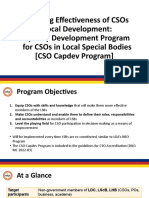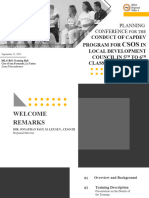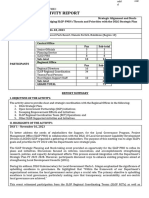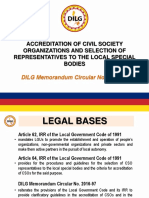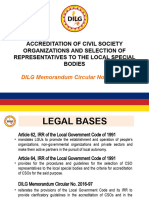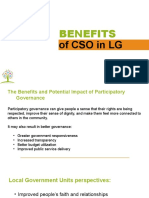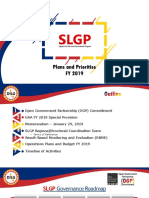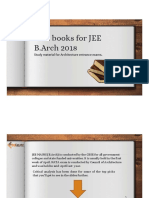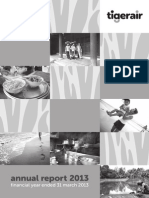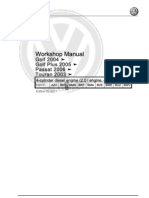Enhancing Effectiveness of Civil Society Organizations (CSOs) in Local Development:
A Capacity Development Program for CSOs in the Local Special Bodies (LSBs)
Focus Group Discussions (FGDs) on Training Methods: Activity Design
March-April 2021
I. Background and FGD Objectives
The Program intends to contribute in addressing the gap particularly on the capability of CSOs
in LSBs to participate and perform their functions effectively as members. As a result, the CSOs
can influence planning and budgeting to make local plans and budgets more responsive to the
needs of the communities. Specifically, the program aims to: a) Equip CSOs with skills and
knowledge that will make them more effective members of the LSBs; b) Make CSOs understand
and enable them to define their roles, responsibilities and accountabilities as members of LSBs;
and c) Level the playing field for CSO participation in decision-making as a means of
empowerment.
As part of preparatory activities, FGDs will be conducted to gather information on applicable
training methods and assess the capacity to participate of non-government participants.
II. Target Participants
The target participants of the FGD are program implementers (i.e., DILG and LGU) and
CSO/non-government program beneficiaries. Specifically, they are shown in Table 1.
Table 1.
Sector Target Respondents
DILG:
Region Division Chief of the concerned division (LGCDD, LGMED) or
representative in-charge of capacity development
and
SLGP Regional Coordinator
Province, City, Municipality Local Government Operations Officer (LGOO)
LGU: Local Planning and Development Coordinator or representative in-
Local Planning and charge of the LDC, LHB, LScB
Development Office
CSO Current non-government/CSO member of the Local Special
Bodies (Can come from civil society organizations, people’s
organizations, academic institutions, cooperatives,
business/private sector, and other non-government organizations)
The number of participants per region is shown in Table 2. Some guidelines in selecting the
LGU participants:
There should be a mix of income classes for LGU respondents across provinces, cities, and
municipalities
LGUs that are part of the Retooled Community Support Program (RCSP) and SBDP are
excluded
Table 2.
1
� Number of participants
REGIONS LGUs CSOs
CAR 2 2
NCR 2 2
I 10 10
II 2 2
III 2 2
IV – A 2 2
IV-B 2 2
V 2 2
VI 10 10
VII 2 2
VIII 2 2
IX 10 10
X 2 2
XI 2 2
XII 2 2
XIII 2 2
TOTAL 56 56
III. Schedule and Program
Six (6) FGDs will be conducted from March to April. The coverage and total number of
participants per FGD are shown in Table 3.
Table 3.
FGD Series Coverage Total number of participants
FGD 1 NCR, CAR, Regions II, III 36*
FGD 2 Regions IV-A, IV-B, V, VII, VIII 35*
FGD 3 Region X, XII, XII, XIII 36*
FGD 4 Region I* 25**
FGD 5 Region VI* 25**
FGD 6 Region IX* 25**
* 9 pax per region (Breakdown: 2 RO, 1 Province, 1 City, 1 Mun, 2 LGU, 2 CSO)
**Breakdown: 10 LGUs, 10 CSOs, 2 RO, 1 Province, 1 City, 1 Mun
The first three FGDs in March will be organized online by the SLGP-PMO. The final three FGDs
will be led by three selected regions and can be done face-to-face, with guidance from the
SLGP-PMO. The schedule of activities is shown in Table 4.
Table 4.
Activity Timeframe Responsible
office
1. Online orientation/discussion with ROs on the March 8 SLGP-PMO
FGD
2. Conduct of FGD Series:
a) FGD 1 (SLGP-organized) March 16 SLGP-PMO
2
� Activity Timeframe Responsible
office
b) FGD 2 (SLGP-organized) March 19 SLGP-PMO
c) FGD 3 (SLGP-organized) March 23 SLGP-PMO
d) FGD 4 (RO-organized) 1st week of April RO I
e) FGD 5 (RO-organized) 1st week of April RO VI
f) FGD 6 (RO-organized) 1st week of April RO IX
3. Submission of FGD documentation April 13 RO I, VI, IX
4. Consolidation and analysis of FGD results April 14-16 SLGP-PMO
5. Presentation of FGD results April 20 SLGP-PMO
For the online FGDs, the duration is two (2) hours and the general program flow is shown below
(Table 5). For the face-to-face FGDs, the program in Table 5 will be adopted and may be
extended to 4 hours to maximize the discussion. The SLGP-PMO team will join the face-to-face
FGDs of the regions via Zoom.
Table 5.
Duration Activity Resource Person
1:30 pm Logging in of organizers
1:50 pm Admit participants, videos on loop/music
2:00 – 2:30 pm Invocation and National Anthem
(30 minutes) Opening Remarks Mr. Richard Villacorte
Introduction of Participants Ms. Justine Figueroa
Objectives of the Activity
2:30 – 2:45 pm Presentation: Overview of the Capacity Ms. Jennifer De Belen
(15 minutes) Development Program for CSOs in the LSBs
2:45 – 3:00 pm Open Forum Ms. Jennifer De Belen
(15 minutes)
3:00 – 3:45 pm Breakout Session Facilitators
(45 minutes) Group 1: DILG RO, LGU
Group 2: CSOs
3:45 – 4:00 pm Next Steps and Closing Remarks Mr. Allyn Lopez
(15 minutes)
The guide questions for the breakout sessions are as follows:
Group 1: DILG RO, LGU (Facilitator: Allyn Lopez, Documenter: Joel Ingeniero)
1. Have you done trainings for CSOs in the past, specifically on topics related to LSBs? What
is your experience in organizing and managing these trainings?
2. Can you describe the profile of CSOs in LSBS in your areas
(accessibility/connectivity/capacity to participate, interest or training needs)? What do you
think are their needs in terms of capacity development and for them to effectively participate
in the LSBs?
3. Do you have experience in hosting and joining online trainings? What is your experience on
this?
4. What are your needs (example: technical assistance, funding) to effectively facilitate an
online training for CSOs in the LSBs? Other recommendations.
Group 2: CSOs (Faci: Jennifer De Belen, Documenter: Jenai Apostol)
1. Have you participated or attended training about the LSB in which you are a member of?
3
�2. What topic about the LSB would you like to learn? What skill or competence would you like
to learn for you to become a more effective member of the LSB? Specify at most 3.
3. Have you attended or joined/currently attending or joining online
trainings/webinars/meetings? How would you describe your experience in joining online
webinars/meetings/trainings?
4. If participating in online training is not possible for you, what is your preferred mode of offline
training/learning? Other recommendations.
5. How much time are you willing to devote to undertake a training on the LSB?
A documentation template (see below) will be provided to the ROs to ensure that all insights are
captured and for easier consolidation.
Documentation template:
Attendees:
Name Designation Organization/LGU/Agency
FGD Proper
Group 1:
Guide Question Response (highlights/bullets)
1. Have you done trainings for CSOs in the (Sample responses)
past, specifically on topics related to 9 out of 10 said yes (or a majority said yes)
LSBs? What is your experience in A few participants said that they had a
organizing and managing these trainings? good experience in organizing trainings
because..
2. Can you describe the profile of CSOs in
LSBS in your areas? What do you think
are their needs in terms of capacity
development and for them to effectively
participate in the LSBs?
3. Do you have experience in hosting and
joining online trainings? What is your
experience on this?
4. What are your needs (example: technical
assistance, funding) to effectively facilitate
an online training for CSOs in the LSBs?
Group 2:
Guide Question Response (highlights/bullets)
1. Have you participated or attended training
about the LSB in which you are a member
4
� of?
2. What topic about the LSB would you like to
learn? What skill or competence would you
like to learn for you to become a more
effective member of the LSB? Specify at
most 3.
3. Have you attended or joined/currently
attending or joining online
trainings/webinars/meetings? How would
you describe your experience in joining
online webinars/meetings/trainings?
4. If participating in online training is not
possible for you, what is your preferred
mode of offline training/learning? Other
recommendations.
5. How much time are you willing to devote to
undertake a training on the LSB?




